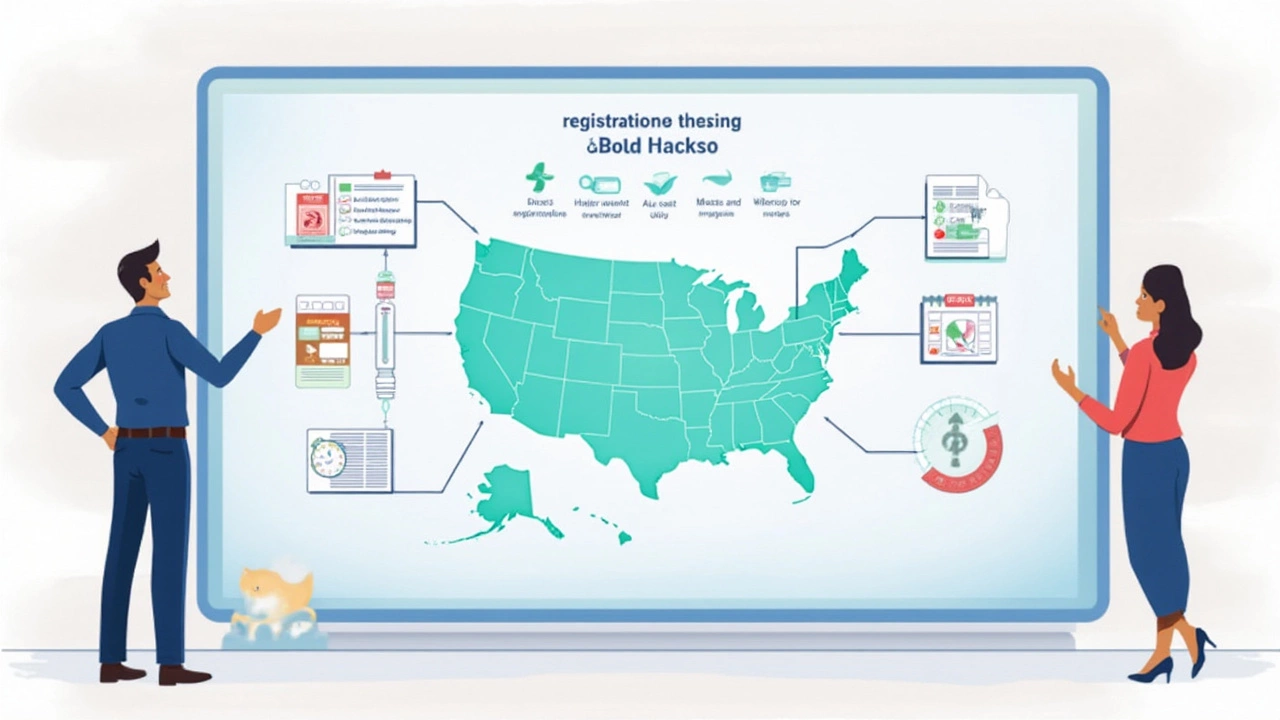You might assume that opening a business in the United States is a fast, digital snap—just fill out a form online, click submit, and voilà, you’re official by lunch. Not so fast. The truth is, the registration process is full of winding timelines, state quirks, and a handful of little-known pitfalls. Some founders zip through in a day, others get stuck for weeks over a missing document or a slow government website. Let’s peel back the curtain on this process, the real pace, and the best ways to dodge delays that too many people discover after it’s too late.
What Happens Before You Register—And Why It Matters
Before you ever fill in a government form, there’s groundwork. You choose your business structure—are you a sole proprietor, partnership, LLC, corporation, or something else? This decision can take just minutes for a solo freelancer, but if you’re wrangling co-founders or investors, expect emails, nervous calls, and maybe a lawyer in the mix.
The structure you pick shapes everything from taxes (LLCs get pass-through taxation; corporations face double taxation) to protection levels and paperwork volume. Most small US businesses file as LLCs (Limited Liability Companies), and that’s because in 2023, over 69% of new US businesses chose this route (according to Statista).
Right after that structure choice, you’ll need a business name. Don’t get too attached to something off the top of your head; states love to reject names already in use—or even ones that sound too similar. Quick tip: Every state offers an online search to check if your name’s taken. Use it. If you do want to reserve your name while ironing out the rest, you can often pay a small reservation fee. This step alone can save you a week of going back and forth with state officials if you dive in unprepared.
Now, for many businesses, there’s a need for state or federal licenses. Sellers dealing in food, alcohol, finance, or childcare hit heavy regulations. Sometimes, you’re fine with just a city business license; other times, you need state and federal green lights, and those approvals can range from minutes to months—especially where health or safety is involved.
Step-by-Step Registration Timelines—What to Actually Expect
The real answer to "how long does it take to register a business in USA" depends mostly on three things: the type of business entity, the state you’re registering in, and whether you nail every form and fee the first time. Here’s how that breaks down for the most common routes:
- Sole proprietorship/partnership: No state filing in most cases—just a city business license, which can take a few minutes up to a week (if there are a lot of local checks).
- LLC: State governments process filings anywhere from a few hours (in New York, which offers same-day filings for a fee) up to four weeks (hello, California and Arizona, especially if you file by mail).
- Corporation (Inc.): Expect one to four weeks in most states, but Wyoming and Delaware routinely process corporate filings in under a week.
Let’s dig into a table of averages for online processing (not counting snail mail, which is always slower):
| State | LLC Formation (Online) | Corporation Formation (Online) |
|---|---|---|
| Delaware | 1-3 days | 1-3 days |
| California | Up to 4 weeks | Up to 4 weeks |
| Texas | 2-3 days | 2-3 days |
| New York | Same day (extra fee) | Same day (extra fee) |
| Florida | 2-6 days | 3-5 days |
Here’s a pro move: If you’re impatient, most states will let you pay for expedited processing. For example, Delaware charges an extra $100 to finish in 24 hours, and it’s totally worth it if you’re in a rush.
Mail and paper forms? Unless you love waiting, just don’t. 95% of founders opting for online registration in 2024 sailed through twice as fast as those who filed the old-school way. If you absolutely must go offline, prepare for it to double or triple your timeline.

Hidden Speed Bumps and How to Dodge Them
What slows people down? The most common hiccup is incomplete paperwork—missing signatures, skipped sections, or mistakes like using your home address when a registered agent is required. Another hang-up: some states want you to publish a notice in a local newspaper (New York, I’m looking at you), which means finding a paper, submitting your business details, then sending proof to the state. This newspaper requirement alone can add six weeks, so plan ahead.
If you’re a non-resident (say, an Aussie living in Sydney hoping to crack the US market), you can still open a US company, but you’ll need a Registered Agent with an address in the state. Services like Northwest Registered Agent and LegalZoom charge a yearly fee but can set things up in hours once you provide them your documents.
Don’t forget the federal side—every business that hires workers or pays taxes needs an Employer Identification Number (EIN). Apply through the IRS website and most people get their number instantly if they’re online between 7am-10pm EST. Mess up the form? That adds a 2-week mail delay. Extra spicy tip: US non-residents have to fax their EIN applications if they can’t finish online. Yes, fax. Welcome to 1994.
There’s the banking hurdle, too. Most banks won’t let you open a local business checking account until your state registration is final and your EIN is active. This is where new founders get impatient—but you can speed things up by booking an appointment and bringing every document the first go. Some fintechs like Mercury or Brex will let you open an account remotely, but they still want those state approvals up front.
Does the State You Register In Matter?
The state makes a massive difference—not just in timing, but in your costs, paperwork headaches, and some sneaky legal rules. Delaware is famous for how friendly and fast it is for corporations, which is why two-thirds of all Fortune 500 companies are registered there. That’s more about legal perks for big business, but even small startups love the 1–3 day turnaround.
Wyoming is a favorite for digital businesses and non-residents. It doesn’t require publishing a notice (looking at you again, New York), and you’ll pay less in annual fees—often under $100 for the year. Plus, they’ll process an online LLC in a couple of days.
But here’s the catch: If you’re running your actual shop or office out of Florida, don’t register in Wyoming or Delaware just to save time. States want you registered where you do business. File elsewhere, and you’ll end up ‘foreign registering’ your company in your real home state anyway (meaning more forms, extra annual fees, a lot more hoops).
A little-known stat: California has the slowest turnaround, averaging three weeks even for online filings when the state gets busy during peak seasons (usually January and July, when everyone’s filing annual returns). If you’re in a hurry in California, pay for next-day processing.
Feeling stuck? Talk to local business groups or mentors—they know the specific speed bumps unique to each state and city. States update their websites surprisingly often (Texas overhauled its portal in 2022), so yesterday’s info might already be out of date.

Fast-Track Tips and Hacks for Quick US Business Registration
Want to breeze through? Start with a clear checklist. Have your official name (with a backup), personal details, business address (or registered agent info), member/owner details, and payment method ready before logging into any state portal. Set aside an hour or two without distractions—you’ll miss fewer things this way.
File online whenever possible. Pay for expedited service if your state offers it—the $50–$100 cost is nearly always worth it compared to potential days or weeks waiting for standard processing. Know that states get bogged down at the start of the year; filing in March or October is faster.
For the federal EIN, use the online IRS tool if you have a Social Security Number. For non-US residents, gather every document you’ll possibly need—including your country’s government photo ID and proof of address. Some folks try to fudge answers to speed up processing; don’t. The IRS and state offices reject dodgy paperwork fast, and getting back in line can cost you weeks.
Hit up local Small Business Development Centers online for checklists by state; they’re free, updated regularly, and won’t try to pitch you legal services. If you hit a snag, call the state filing office—real people actually answer the phone in less-busy states like Wyoming and Texas, and can walk you through a stuck application in minutes.
Red tape doesn’t have to kill your launch. The process is mostly digital—at least 90% of new US companies are set up online, sometimes in a single afternoon. Use every shortcut, and keep close tabs on your application’s status (especially if you must send anything by mail).
Remember, the wild card isn’t always the government office; sometimes, it’s your own paperwork, missing forms, or skipped steps that drag things out. The more you prep upfront, the smoother and faster the ride. With the right hacks and the right attitude, you’ll join the ranks of registered US businesses before your next coffee refill.

